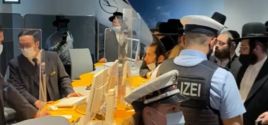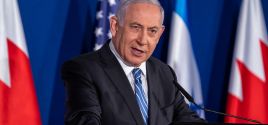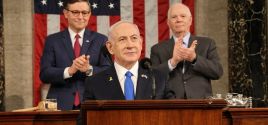What Is The Role Of Iran?Dennis L. Cuddy, Ph.D.Mar. 08, 2006 |
Popular 
Lufthansa Fined Record $4M for Alleged 'Discrimination' Against Jewish Passengers

Netanyahu Won't Commit to Not Striking Iranian Nuclear or Oil Sites But Will 'Consider' U.S. Warnings

'Anti-Cancel Culture Conservatives' Seek to Cancel Writer Chris Brunet for Criticizing Israel

U.S. Spends Record $23 Billion On Israel Since Oct 7

'The First Live-Streamed Genocide': Al Jazeera Documentary Exposes Israeli War Crimes in Gaza
 For many years, one has heard of an 1871 plan of Albert Pike (Luciferian) and Giuseppe Mazzini (Italian revolutionary referred to as an "established point of light when rays traversed the world") to overthrow all religious and monarchical authority. It called for 3 world wars, the third of which would be between Islam and the Judeo-Christian West. There has been much debate over whether this plan was a hoax because author William Guy Carr learned of it from the writings of Cardinal Caro y Rodriguez of Chile in the 1920s, which would be after the First World War and in anticipation of the Second World War. However, most researchers have not bothered to find out that Cardinal Rodriguez referred to 2 French books from the 1890s---BEFORE any world war occurred ! In one of them, LE PALLADISME (1895) by Domenic Margiotta, Pike is referred to as "the Great Luciferian Pontiff," and the author relates that Pike wrote a pamphlet describing a "project of universal destruction" in which the religions of the world, including Islam, would literally war against each other. Margiotta also reveals that according to Pike's plan, "There are also the outcasts, the miserable ones, several millions of free-thinking deists, and 2 million atheists, dedicated by the great Luciferian Pontiff to the reprobation of the sect, threatened by complete extermination or by complete conversion to the religion of the 'True Light' (Lucifer)." The original Pike pamphlet has not been found, but we know that this sounds like Pike, because in both his MORALS AND DOGMA (1871) and INDO-ARYAN DEITIES AND WORSHIP (1872), he praised Lucifer and on page 817 of MORALS AND DOGMA he opined that "The Papacy and the rival monarchies...tomorrow, perhaps, will destroy each other....The world will soon come to us for its Sovereigns and Pontiffs. We shall constitute the equilibrium of the Universe, and be rulers over the Masters of the World." Since Muslims (among others) were part of the Pike plan, it is important to look at what the role of Iran might be in bringing about a global conflagration, since an Iranian sect today believes such a conflict could bring the Mahdi (a Muslim prophet who is supposed to appear before the end of the world). In an article, "Later than we think" (THE WASHINGTON TIMES, February 6, 2006), Arnaud de Borchgrave explained that Iranian "President Mahmoud Ahmadinejad's Shiite creed has convinced him lesser mortals can not only influence but hasten the awaited return of the 12th Imam, known as the Mahdi. Iran's dominant 'Twelver' sect holds this will be Muhammad Ibn Hasan, the righteous descendant of the Prophet Muhammad. He is said to have gone into 'occlusion' in the 9th century, at age 5. His return will be preceded by cosmic chaos, war, bloodshed and pestilence. After this cataclysmic confrontation between the forces of good and evil, the Mahdi will lead the world to an era of universal peace....President Ahmadinejad reckons the return of the Imam, AWOL for 11 centuries, is only two years away. Mr. Ahmadinejad is close to the messianic Hojjatieh Society, which is governed by the conviction the 12th Imam's return will be hastened by 'the creation of chaos on Earth'." An attack on Iran would also certainly drive oil prices up, plus the leaders of Iran could also send thousands of suicide bombers into Iraq to create even more chaos in that country. Regarding the chaos in Iraq, one might want to reflect upon the description of "chaos theory" in SPIRITUAL POLITICS: CHANGING THE WORLD FROM THE INSIDE OUT by Corinne McLaughlin and Gordon Davidson (who worked for Lucis Trust, formerly Lucifer Publishing), in which they revealed that "at the heart of the most random or chaotic event lies order, pattern, and causality, if only we can learn to see it in a large enough context." There is no evidence that Albert Pike was ever a close personal friend of Cecil Rhodes, but at about the same time Pike developed his plan which he shared with Mazzini, a young Cecil Rhodes began to develop his own plan for a secret Society of the Elect "to take the government of the whole world," in Rhodes' own words. And since those carrying out Rhodes' plan would come to control British foreign affairs for decades, it is worth examining Britain's role in promoting a pan-Islamist movement, especially pertaining to Iran and Iranians. The radical Islam of the Iranian mullahs today traces its origin back through the Muslim Brotherhood (founded in Egypt in 1928) to the 1870s. According to Robert Dreyfuss in DEVIL'S GAME: HOW THE UNITED STATES HELPED UNLEASH FUNDAMENTALIST ISLAM (2005), "from the 1870s to the 1890s, Jamal Eddine al-Afghani (an Iranian) was supported by the United Kingdom." Afghani in 1885 proposed the idea of a British-led pan-Islamic alliance, and "in 1882, in India, according to a secret file of the Indian government's intelligence service---Afghani officially offered to go to Egypt as an agent of British Intelligence." Afghani formed many secret societies, and his chief disciple was Egyptian pan-Islamic activist Mohammed Abduh. Abduh's ideas were promoted in Egypt in THE LIGHTHOUSE magazine, which influenced Hassan al-Banna, founder of the Muslim Brotherhood in Egypt. After the British literally took control of Egypt in 1881, Flora Shaw in 1886 went there as a correspondent for William Stead's PALL MALL GAZETTE. Stead was a confidante of Cecil Rhodes, and both Rhodes and Shaw (and Gandhi) were disciples of John Ruskin, who wrote of the British that "We are still undegenerate in race; a race mingled of the best northern blood." Ruskin also espoused a Socialist doctrine in TIME AND TIDE (1867), with greater Government authority over the people. Stead introduced Shaw to Rhodes in 1889, two years before Rhodes' secret society was formed, and Shaw became an ardent supporter of Rhodes' dream. Upon Rhodes' death, his plan was implemented by Lord Alfred Milner, whose allies controlled British foreign affairs for decades. One of Milner's allies, Sir Edward Grey, misled the German Ambassador to England into thinking Britain would not enter the conflict over the assassination of Archduke Franz Ferdinand, thereby leading to the First World War in 1914. In the MONTREAL GAZZETTE (September 11, 1912) is related by Abdul-Baha that "the time is less than two years hence" when "a tiny spark will set the world ablaze." Abdul-Baha was the leader of the Baha'i, which promotes world government and one common faith. The Baha'i religion was founded in Iran by Baha Ullah, known as the "Point" or "Unity" who spoke of a United Nations of the World as early as 1860. And according to Robert Dreyfuss in DEVIL'S GAME, the Baha'i religion has been accused of having ties to British Intelligence, with Abdul-Baha knighted by the British government. Before World War I, the British had already helped the family of Ibn Saud create the first fundamentalist (Wahhabi) Islamic nation of Saudi Arabia, and helped install Hashemites as kings of Iraq and Jordan. After the First World War, Sir Percy Cox in November 1922 drew up what became the Iraq-Kuwait border, which deliberately did not allow Iraq access to the sea, so it would remain dependent upon Britain. This would play an important part in Iraq's resentment toward the West and Kuwait, which helped to cause recent conflicts in that region. After the Second World War, the pan-Islamic Muslim Brotherhood was used by British Intelligence (MI6) and the CIA against nationalist leaders Gamel Abdel Nasser in Egypt and democratically elected Mohammed Mossadegh in Iran. When Mossadegh nationalized Iranian oil in the early 1950s, the British and CIA funded his overthrow in August 1953 with the help of Ayatollah Seyyed Abolqassem Kashani, and reinstalled the Shah of Iran. The U.S. then in 1978 removed from power the Shah, who was succeeded by Ayatollah Ruhollah Khomeini, who had been mentored by Kashani. In 1979, President Jimmy Carter's National Security Adviser Zbigniew Brzezinski thought he could use the Iranian government, including the Iranian Shiite mullahs as part of an "arc" of resistance from Egypt eastward against Soviet expansionism. When "students" supported by Khomeini took over the U.S, Embassy in Tehran, Iran, it presented a crisis. However, as Robert Dreyfuss notes: "Along with the threat from Khomeinism, some U.S. policy makers also saw opportunity...using the Islamic right to undermine the Soviet Union in its own empire, deep in Central Asia....The twin Islamic movements in Iran and (Muslim Brotherhood linked organizations like Al Qaeda in) Afghanistan, inspired Brzezinski and Bill Casey (President Reagan's CIA director) to pursue the Islam-in-Asia ('arc-of-Islam') theme aggressively." Brzezinski developed a plan of financial and other support for Afghanistan hoping to lure the Soviets into involvement in a quagmire there, and the Soviets invaded in December 1979. After this, Zalmay Khalilzad (current U.S. Ambassador to Iraq), a neoconservative RAND strategist, wrote a paper explaining "the Khomeini regime also poses risks to the Soviets. The change of regime has encouraged similar movements in Iraq and Afghanistan, and might even affect Soviet Muslim Central Asia." Perhaps it is useful at this time to remember that according to a 1952 map prepared by the World Association of Parliamentarians for World Government meeting in London in 1952, when the World Government comes into being, U.S. forces would be patrolling Central Asia (e.g., Kazakhstan, Uzbekistan, etc.). Brzezinski at Mikhail Gorbachev's first State of the World Forum in 1995 said: "We cannot leap into world government through one quick step. A consensual global system requires a process....The precondition for eventual and genuine globalization is progressive regionalization because by that we move toward larger, more stable, more cooperative units." This is the same strategy proposed by Cecil Rhodes' Association of Helpers member P. E. Corbett in POST-WAR WORLDS (1942). Relevant to this, the Bank for International Settlements (BIS, the world's central bank for all nations' central banks) produced in 2003, Paper No. 17, "Regional Currency Areas and the Use of Foreign Currencies." The BIS has been promoting the "Amero" as the currency for a North American Monetary Union, first proposed in 1999 by the Fraser Institute of Canada. The ultimate goal of the power elite is to link all regional economic arrangements into a single global system with one global currency which, according to THE ECONOMIST (January 9, 1988), will be around 2018 A.D. and called the "Phoenix." Part 2 In 1981, Ronald Reagan became President, but unfortunately ignored the threat from Iran early in his administration. According to longtime CIA Middle East operative Robert Baer in SEE NO EVIL (2002), Baer looked at "an intelligence report from March 1982---a full thirteen months before the embassy bombing---stating that Iran was in touch with a network capable of destroying the U.S. embassy in Beirut. A subsequent report even specified a date the operation should be carried out." The attack was carried out by the Islamic Jihad Organization, which Baer described as "merely a front for the Iranians." Baer further reasoned that "the conclusion was unavoidable: The Islamic Republic of Iran had declared a secret war against the United States, and the United States had chosen to ignore it." The U.S. government during the Reagan years also knew that the Iranian-sponsored Islamist network was already here in the U.S. in the mid-1980s. In TARGET AMERICA: TERRORISM IN THE U.S. TODAY (1993) by Yossef Bodansky (director of the U.S. House of Representatives Task Force on Terrorism and Unconventional Warfare), one learns that this network "had markedly expanded and become better organized. The Islamist infrastructure already included all the components of a mature terrorist support system. These included safe houses in major cities, weapons, ammunition, money, systems to provide medical and legal aid, false identity papers, and intelligence for the operative. The network was also large and spanned the United States." Bodansky also revealed that "the training of suicide pilots started in Busher air base in Iran in the early 1980s....The first installation was established in Wakilabad near Mashhad....According to a former trainee in Wakilabad, one of the exercises included having an Islamic jihad detachment seize (or hijack) a transport aircraft. Then, trained air crews from among the terrorists would crash the airliner with its passengers into a selected objective." Two years after Bodansky wrote this, additional information was developed. According to Associated Press writer John Solomon's "Warnings Before 1995 Oklahoma Bombing" (June 20, 2002), "'Iranian sources confirmed Tehran's desire and determination to strike inside the U.S. against objects symbolizing the American government in the near future,' said a February 27, 1995, terror warning by the House Task Force on Terrorism and Unconventional Warfare. The warnings became increasingly specific as to the possible location, type of attack, and likely dates. 'These strikes are most likely to occur either in the immediate future or in the new Iranian year---starting 21 March 1995,' the congressional task force predicted." Then Jim Crogan in "An Oklahoma Mystery: New hints of links between Timothy McVeigh and Middle Eastern terrorists" (L.A. WEEKLY, July 24-30, 2002) stated that Bodansky wrote "that after the bombing, it was determined that Oklahoma City had been 'on the list of potential targets.'...An undated intelligence report by Bodansky discusses alleged terrorist training inside the U.S. that included some 'Lilly Whites.'...Bodansky states the training was ordered by Iran and conducted by Hamas operatives....The second training occurred in 1993. It was specifically for Lilly Whites. They also used code names and were given state-of-the-art car-bomb training. Bodansky's sources also report that at least two of the 1993 participants came from Oklahoma City." In Yossef Bodansky's BIN LADEN (1999), one then learns that "in the early months of 1996, Tehran started laying the foundation for the next phase in the terrorist jihad, establishment of the HizbAllah International, with (Osama) bin Laden in a senior position. The significance of this organization for the prevailing terrorist threat was demonstrated in its first strikes: the bombing of the U.S. barracks in Khobar, Saudi Arabia; the downing of TWA 800; and the assassination of a U.S. intelligence officer in Cairo." Given the revelations above, how could the U.S. possibly have all this information unless American intelligence agencies have been monitoring the Iranians in the U.S. and elsewhere for a long time? Secondly, why would the U.S. want to oust a contained, secularist Saddam Hussein from Iraq, and have elections there resulting in Islamic law being imposed by a Shiite majority religiously aligned with Iran, which is closer to having nuclear weapons (WMD) than Saddam ever was? And most recently, why would the Bush administration so vigorously defend its approval of the sale of a company managing at least 6 major U.S. ports to Dubai Ports World of the United Arab Emirates (UAE), which supported Osama bin Laden and the Taliban before 9/11 and since 9/11 has still served as a base for Al Qaeda? Wouldn't computer access to port security information be useful to Al Qaeda or Iranian-supported terrorists? Remember that 2 of the 9/11 hijackers were from the UAE, and according to Niles Lathem's article, "Qaeda Claim: We 'Infiltrated' UAE Gov't" (NEW YORK POST, February 25, 2006): "Al Qaeda warned the government of the United Arab Emirates more than three years ago that it 'infiltrated' key government agencies, according to a disturbing document released by the U.S. military. The warning was contained in a June 2002 message to UAE rulers, in which the terror network demanded the release of an unknown number of 'mujahedeen detainees,' who it said had been arrested during a government crackdown in the aftermath of the 9/11 attacks. The explosive document is certain to become ammunition for critics of the controversial UAE port...." Also recall that CIA agents allegedly met with Osama bin Laden at a Dubai hospital in July 2001 (see Alexandra Richards's "CIA Agent Allegedly Met bin Laden in July," LE FIGARO, October 31, 2001; and see Anthony Simpson's "CIA agent alleged to have met bin Laden in July," THE GUARDIAN, November 1, 2001). And while you are recalling this, you might also want to remember that a UAE sheik gave at least $1 million to the (George H.W.) Bush Library Foundation. Last year, Dubai International Capital, a government-backed buyout firm, invested in an $8 billion fund of the Carlyle Group, for which former President Bush has been a consultant and marketer, and the current President Bush has received fees as director of a subsidiary. What will probably happen with the Dubai Ports World takeover is that another 45-day review will give the Bush administration time to "educate" (arm twist) enough Congressional Democrats and Republicans not to demand certain guarantees (e.g., Can Americans be guaranteed no employee of Dubai Ports World will be threatened by Al Qaeda into providing security information from computers?) regarding national security because of the takeover. This is despite an Associated Press article, "Paper: Coast Guard Has Port Co. Intel Gaps," by Liz Sidoti on February 27, 2006, that begins: "Citing broad gaps in U.S. intelligence, the Coast Guard cautioned the Bush administration that it was unable to determine whether a United Arab Emirates-owned company might support terrorist operations, a Senate panel said Monday. The surprise disclosure came during a hearing on Dubai-owned DP World's plans to take over significant operations at six leading U.S. ports." What might precipitate a conflict between Iran and the U.S.? Next month (March 2006), Iran will bring online the "Bourse" exchange for oil sales around the world, which could accept Euros, etc., instead of dollars (currently nations must use dollars to buy oil). In November 2000 (when George W. Bush was elected president), Iraq stopped accepting dollars for oil and under the U.N. oil-for-food program switched to the Euro. After the U.S. invaded Iraq, we had Iraq switch back to accepting the dollar. According to economic expert Jim Puplava, the Iranian action this March will be the first serious challenge to Anglo-American dominance of the commodities market globally. This will challenge the status of the dollar as nations' reserve currency, which will lessen the value of the dollar for Americans, thereby impacting our economy (e.g., greater budget deficits, because we cannot just print dollars to pay our debt without lessening the value of the dollar). Watch for some type of reaction to this by the U.S. government, including attempts to destabilize the government of Iran. And if that fails, watch for some type of "incident" that will precipitate U.S. (or Israeli) military action against Iran (remember the 2 British agents dressed as Arabs who recently caused "incidents" until caught by Iraqi police). Perhaps the only reason such action has not already occurred is because China has a tremendous economic stake in Iranian oil, etc. And China has purchased a great deal of American debt. What if they threaten to no longer do this if the U.S. attacks Iran? And remember here that China has also contributed tens of thousands of dollars to the George Bush Presidential Library at Texas A&M. And what might Iran do if attacked? Yossef Bodansky revealed that Iranians were responsible for downing TWA 800. What if Iranian agents in the U.S. downed several American airliners? Do you remember the effect upon our economy as a result of 9/11? And what if Iranian agents here used helicopters to attack athletic stadiums filled with tens of thousands of people? What if they also derailed trains here carrying passengers or dangerous chemicals? What if they set fires to forests, apartment complexes, etc., at night? What if they blew up gas lines in cities? What if they poisoned foods in grocery stores and fast-food restaurants? If they did these things, and more, the human and economic impact would be many times greater than the impact of 9/11. And concerning what Iran might do to Israel if attacked, Yossi Melman (HAARETZ correspondent) in "Iranian advisor: We'll strike Dimona in response to U.S. attack" (February 25, 2006), reported: "If the United States launches an attack on Iran, the Islamic republic will retaliate with a military strike on Israel's main nuclear facility. Dr. Abasi, an advisor to Iran's Revolutionary Guard, said Tehran would respond to an American attack with strikes on the Dimona nuclear reactor and other strategic Israeli sites such as the port city of Haifa and the Zakhariya area. Haifa is also home to a large concentration of chemical factories and oil refineries. Zakhariya, located in the Jerusalem hills, is---according to foreign reports---home to Israel's Jericho missile base." Syria is also targeted by the U.S., and the justification given will be that is where Iraq sent its WMD (which we have known, and I have reported, all along). But just as the U.S. did not like it when Iraq switched from the dollar to the Euro, the U.S. did not like it when early this month (February 2006), Syria also switched from the dollar to the Euro for international currency exchange transactions. This likewise could play a role in whether the U.S. takes action against Syria. |



